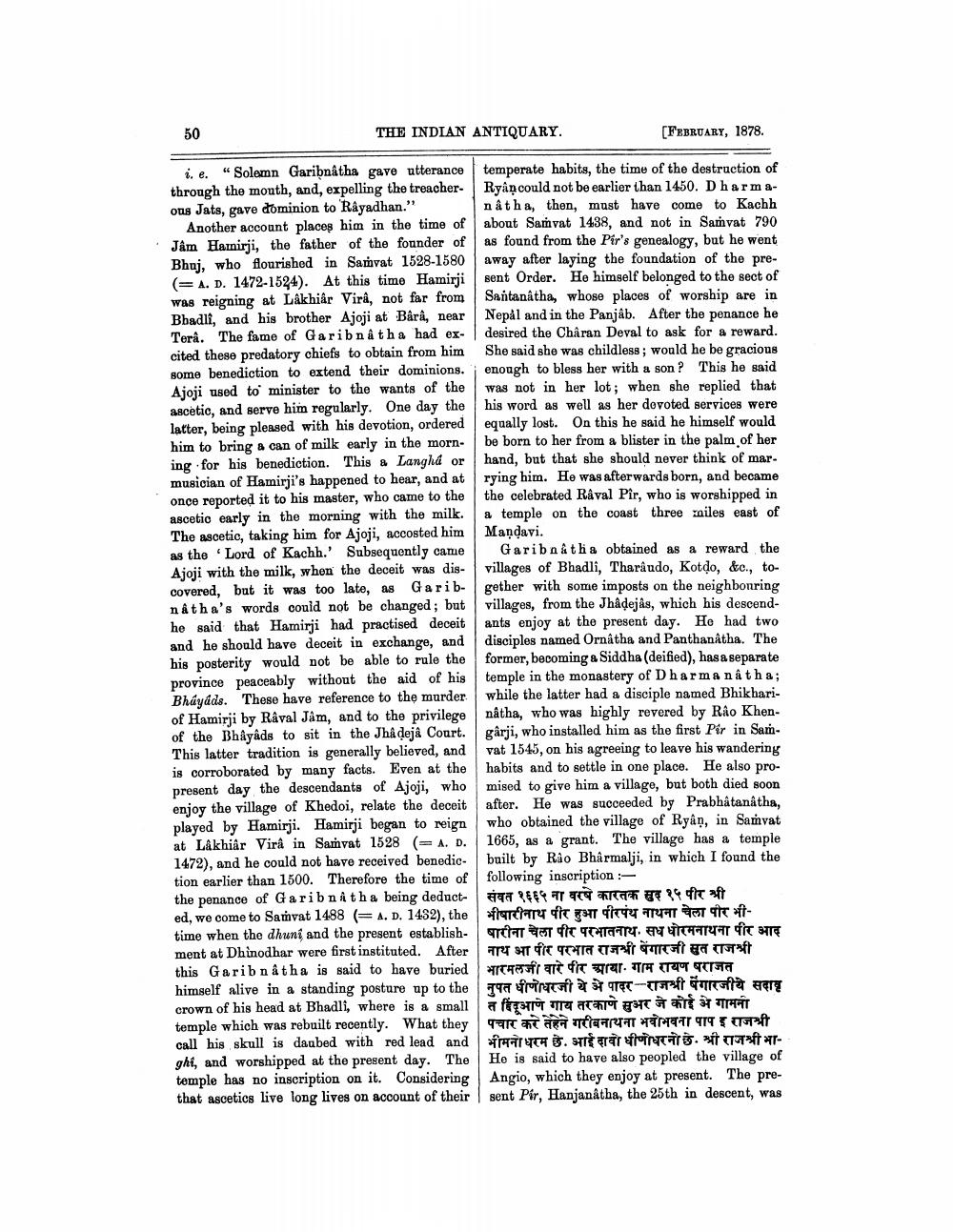________________
50
THE INDIAN ANTIQUARY.
[FEBRUARY, 1878.
temperate habits, the time of the destruction of Ryan could not be earlier than 1450. Dharmanatha, then, must have come to Kachh about Samvat 1438, and not in Samvat 790 as found from the Pir's genealogy, but he went away after laying the foundation of the present Order. He himself belonged to the sect of Santanâtha, whose places of worship are in Nepal and in the Panjâb. After the penance he desired the Châran Deval to ask for a reward. She said she was childless; would he be gracious enough to bless her with a son? This he said was not in her lot; when she replied that his word as well as her devoted services were equally lost. On this he said he himself would be born to her from a blister in the palm of her hand, but that she should never think of marrying him. He was afterwards born, and became the celebrated Râval Pîr, who is worshipped in a temple on the coast three ailes east of Mandavi.
i. e. "Solemn Garibnâtha gave utterance through the mouth, and, expelling the treacherous Jats, gave dominion to Râyadhan."
Another account places him in the time of Jam Hamirji, the father of the founder of Bhuj, who flourished in Samvat 1528-1580 (A. D. 1472-1524). At this time Hamirji was reigning at Lâkhiâr Virâ, not far from Bhadli, and his brother Ajoji at Bârâ, near Terâ. The fame of Garibnatha had excited these predatory chiefs to obtain from him some benediction to extend their dominions. Ajoji used to minister to the wants of the ascetic, and serve him regularly. One day the latter, being pleased with his devotion, ordered him to bring a can of milk early in the morning for his benediction. This a Langhá or musician of Hamirji's happened to hear, and at once reported it to his master, who came to the ascetic early in the morning with the milk. The ascetic, taking him for Ajoji, accosted him as the Lord of Kachh.' Subsequently came Ajoji with the milk, when the deceit was discovered, but it was too late, as Garibnatha's words could not be changed; but he said that Hamirji had practised deceit and he should have deceit in exchange, and his posterity would not be able to rule the province peaceably without the aid of his Bhayads. These have reference to the murder of Hamirji by Raval Jâm, and to the privilege of the Bhâyâds to sit in the Jha dejâ Court. This latter tradition is generally believed, and is corroborated by many facts. Even at the present day the descendants of Ajoji, who enjoy the village of Khedoi, relate the deceit played by Hamirji. Hamirji began to reign at Lakhiâr Virâ in Samvat 1528 (A. D. 1472), and he could not have received benediction earlier than 1500. Therefore the time of the penance of Garib natha being deducted, we come to Samvat 1488 (A. D. 1432), the time when the dhuni and the present establish ment at Dhinodhar were first instituted. After this Garibnâtha is said to have buried himself alive in a standing posture up to the crown of his head at Bhadli, where is a small temple which was rebuilt recently. What they call his skull is daubed with red lead and ghi, and worshipped at the present day. The temple has no inscription on it. Considering that ascetics live long lives on account of their
Garibnatha obtained as a reward the villages of Bhadli, Tharâudo, Kotdo, &c., together with some imposts on the neighbouring villages, from the Jhâdejâs, which his descendants enjoy at the present day. He had two disciples named Ornâtha and Panthanâtha. The former, becoming a Siddha (deified), has a separate temple in the monastery of Dharmanatha; while the latter had a disciple named Bhikharinåtha, who was highly revered by Râo Khengârji, who installed him as the first Pir in Samvat 1545, on his agreeing to leave his wandering habits and to settle in one place. He also promised to give him a village, but both died soon after. He was succeeded by Prabhâtanâtha, who obtained the village of Ryân, in Samvat 1665, as a grant. The village has a temple built by Râo Bhârmalji, in which I found the following inscription:
f
संवत १६६५ ना वरषे कारतक खुद १५ पीर श्री farrer de ger der पारीना चेला पीर परभातनाथ सघ घोरमनाथना पीर आद नाथ आ पीर परभात राजश्री बेंगारजी सुत राजश्री भारमलजी वारे पीर आया. गाम रायण पराजत नुपत धीणे/धरजी ये जे पादर - राजश्री बॅगारजीये सदावृ
हिंदूआ गाय तरकाणे सुअर जे कोई अ गामनी पचार करे तेहेने गरीबनाथना भवोभवना पाप इ राजश्री भीमनो धरम छे. आई दावो धीणोधरनो छे. श्री राजश्री भाHe is said to have also peopled the village of Angio, which they enjoy at present. The present Pir, Hanjanâtha, the 25th in descent, was




